Hard Time Killin' Floor Blues by Skip James
Hard Time Killin' Floor Blues by Skip James
Robert Johnson died young and became a blues legend. Skip James lived to a ripe old age. It was a bad career move. Born June 21, 1902, in Yazoo City, Mississippi, at the "colored" hospital, Skip James was raised on the Woodbine Plantation, fifteen miles south of Yazoo City and a mile and a half from nearby Bentonia. His mother bought him his first guitar for $2.50 in 1912. Henry Stuckey, a guitarist five years older taught James the venerable eight-bar staple "Drunken Spree."
Hard Time Killin' Floor Blues by Skip James
In 1917 he attended high school and worked on the weekends at Gooching Brothers sawmill. During this time James took rudimentary piano lessons from his cousin Alma Williams, a schoolteacher. In 1921, James moved to Weona, Arkansas, to work as a lumber grader at a sawmill camp. There he met pianist/pimp Will Crabtree. By James's account, Crabtree was a huge man from nearby Marked Tree, Arkansas, who influenced his piano playing and lifestyle. James remained in Weona until 1923.
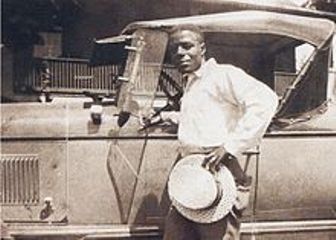
Skip James
Likely as a result of the passage of Prohibition, James returned in 1924 to Bentonia, where he remained for six years. During this time he worked as a sharecropper, but soon began bootlegging "white lightning". He also practiced his guitar playing, working dances with Henry Stuckey in Bentonia, Sidon, and as far away as Jackson, Mississippi.
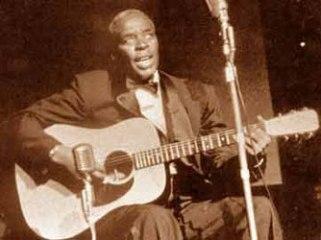
Henry Stuckey
James developed his three-finger picking style, a style practiced by Charley Patton, Mississippi John Hurt, and Jackson native Bo Carter. James's trademark sound came from his E-minor tuning, which he called "cross-note tuning."
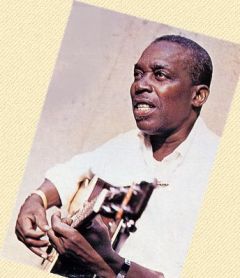
Skip James
His digital dexterity, unusual sound, falsetto singing voice, and proficiency with a guitar convinced Paramount Records talent scout H.C. Speir to recommend James to the label. In February 1931, he waxed eighteen sides at Paramount's Grafton, Wisconsin, studio that were subsequently issued. During the session James established himself at the forefront of blues musicians, evidenced by songs such as "I'm So Glad," "Devil Got My Woman," "Special Rider Blues," "20-20 Blues" and “Hard Time Killin' Floor Blues”.
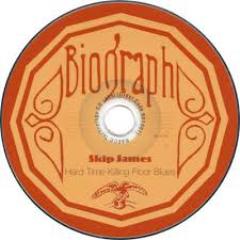
Hard Time Killin' Floor Blues, 1931
The Great Depression struck just as James' recordings were hitting the market. Sales were poor as a result, and James gave up performing the blues to become the choir director in his father's church. James himself was later ordained as a minister in both the Baptist and Methodist denominations, but the extent of his involvement in religious activities is unknown.
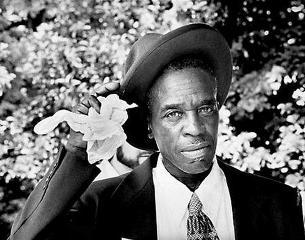
Skip James
In 1952, a high-school student named Dick Spottswood flipped through a stack of jazz records at an Adams Morgan music store. Intrigued by a macabre title—Hard Time Killing Floor Blues—he asked the shop's owner to play a nearly pristine 78 with a Paramount label. The slow, mournful dirge hooked Spottswood. He bought that record for $1 (its only blemishes were crayon marks on the label), and then nabbed another, more worn-out record by the same singer for only 60 cents. Thus began Skip James' second shot at stardom.
Dick Spottswood
A killing floor is the area in a slaughterhouse where the animals are killed. Today this is automated, but in the thirties this was mostly done by individuals. It was a physically hard and brutal on the psyche, but work is work. In this context one wonders if James is working on the killing floor, or waiting there. Does he want out of the only dead-end job he can find, or does he hoping to escape the hammer?
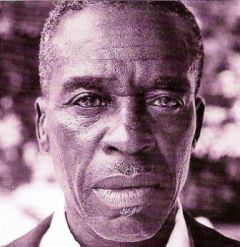
Skip James
It was the summer of 1964, and three California college students—led by Washington-born John Fahey—had ventured into the Deep South not as civil rights activists, but as blues fanatics in search of their hero. They'd found Skip James in a Mississippi hospital, long forgotten by his own community. One of the young admirers offered him a guitar; James no longer owned one. A few days later, the hospital discharged him, after the pilgrims had paid not only James' medical bills, but also the money he owed his landlord.
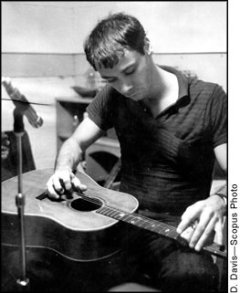
John Fahey
In the mid-'60s Hard Time Killing Floor Blues was the first session Skip James recorded following his rediscovery by John Fahey and Henry Vestine. Though he had not played the blues for more than 20 years, his skills were largely undiminished, and he turns in a fantastic set. James reprises several of his 1931 Paramount sides on this session, as well as a couple new tunes that chronicle the illnesses of James' latter days.
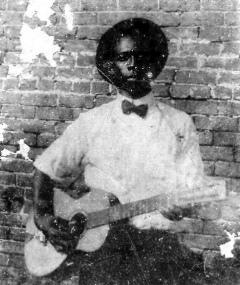
Skip James
James' song, his disheartening chronicle of the Depression, “Hard Time Killing Floor Blues,” stunned the hushed audience, composed mostly of folkies more used to grooving to the warm sounds of songsters.
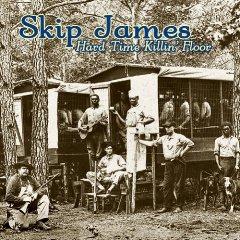
Hard Time Killin' Floor, album
The haunting style and dark honesty of "Hard Time Killin' Floor Blues" is what drew me to it, and it is from this song that I gained my love of old time country blues. The song starts with James' iconic fingerpicking. We hear only a few seconds of guitar before James' high, aching call comes in. "Hard times are here an' everywhere you go times are harder than ever been before." If you are hurtin', and many are these days, this statement feels as prominent today as it did in 1931. "Now people are driftin' from door to door, can't find no heaven don't care where they go." James wails because he knows what it is like to drift like the wind, thin and empty, from door to door.
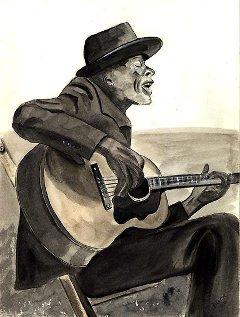
Skip James
Among the earliest and most influential Delta bluesmen to record, Skip James was the best-known proponent of the so-called Bentonia school of blues players, a genre strain invested with as much fanciful scholarly "research" as any. Influencing everyone from a young Robert Johnson (Skip's "Devil Got My Woman" became the basis of Johnson's "Hellhound on My Trail") to Eric Clapton (who recorded James' "I'm So Glad" on the first Cream album), Skip James' music, while from a commonly shared regional tradition, remains infused with his own unique personal spirit.
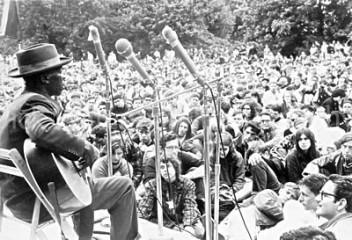
Skip James at Newport 1964
Hard Time Killin' Floor Blues lyrics:
Hard times is there and everywhere you go, Times is harder than ever been before. And the people are driftin' from door to door Can't find no heaven, I don't care where I go. Hear me tell you people, just before I go, These hard times will kill you just dry long so. Well, you hear me singin' my lonesome song, These hard times can last us so very long. If I ever get off this killin' floor, I'll never get down this low no more. No-no, no-no, I'll never get down this low no more. And you say you had money, you better be sure, 'Cause these hard times will drive you from door to door. Sing this song and I ain't gonna sing no more, Sing this song and I ain't gonna sing no more, Hmm... Hard times will drive you from door to door.
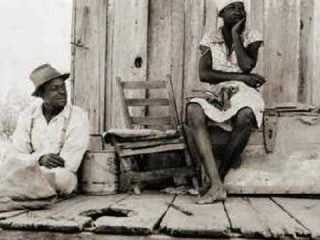
Hard Time








